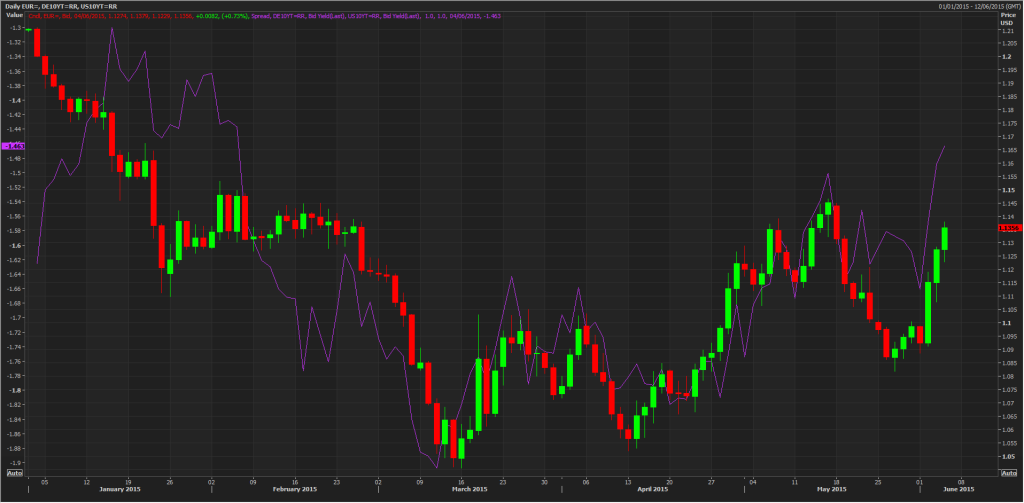Further declines in European bond markets following ECB President Mario Draghi’s comments yesterday on market volatility along with the higher than expected rise in inflation in May, is once again being felt throughout the markets today. The thin liquidity in bond markets is probably exaggerating the move again, as we saw back in April, but I image this will stabilize by the end of the week.
The tightening of the US Treasury-Bund spread as a result of the much stronger sell-off in German 10-Year debt is prompting a strong rally in EUR/USD with which it is very strongly correlated.

Source – Thomson Reuters Eikon
While it’s currently the European story that’s driving these moves in the markets, we shouldn’t forget that a strong jobs report from the US tomorrow would put a September rate hike from the Fed firmly back on the table which could prompt a widening of the spread and therefore reversal in the EUR/USD move.
It is worth noting that despite the wide-ranging sell-off in bond markets, Greek debt is holding up well. Yields on Greek 2, 5 and 10-Year debt all fell heavily yesterday, despite rising strongly elsewhere. We’re seeing further declines in five and 10-year debt today which suggests people are becoming more optimistic that a Greek deal will be reached, although we’re not really seeing this reflected in the broader markets.
While comments from those involved are causing a lot of confusion, with senior officials from the creditors not even able to agree on a consistent message, the general rhetoric is becoming more positive and optimistic and that is being reflected in the markets. I do believe that these negotiations will be drawn out for a few weeks yet, or at least as long as Greece can afford to honour its International Monetary Fund repayments. The next is due tomorrow and both Greek Prime Minister Alexis Tsipras and Finance Minister Yanis Varoufakis have suggested that will be made which the brings us to 12 June when €350 million is again owed to the IMF. If Greece cannot pay this though, the IMF may agree to combine this month’ remaining repayments totaling €1.3 billion and accept them at the end of the June when Greece’s current bailout expires. Especially if negotiations are progressing well.
Equity markets in Europe are lower across the board and this appears to be feeding into U.S. futures as well. A large part of this is probably directly related to the bond market volatility and portfolio re-balancing, although yesterday’s sell-off in commodities is weighing on energy and basic materials stocks, while the stronger euro is probably also weighing. The weakness in the currency is what many have attributed to higher growth expectations for the eurozone as it looks to become more competitive. We are only just beginning to see evidence of this but a rally in the euro could end any positive impact of a weak currency before countries are able to truly benefit from it.
The Bank of England will announce its latest monetary policy decision today, something than for a while now has been something of a non-event. Governor Mark Carney has been very clear that rates are unlikely to rise before the middle of next year with the U.K. still experiencing low inflation, a cooling economy and low productivity. The country is also still facing a number of potential headwinds including tighter fiscal policy, a stronger pound and any negative repercussions that would come if Greece defaulted and left the eurozone. With this in mind, it is likely fall off the radar of investors with no statement, minutes or press conference accompanying the decision.
U.S. jobless claims, revised non-farm productivity and labour costs will be released on the data side which will be followed closely by traders.
